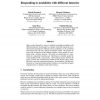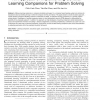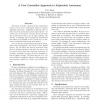306 search results - page 45 / 62 » A framework for the simulation of agents with emotions |
NIPS
2004
13 years 8 months ago
2004
Motor control depends on sensory feedback in multiple modalities with different latencies. In this paper we consider within the framework of reinforcement learning how different s...
SASO
2008
IEEE
14 years 1 months ago
2008
IEEE
We consider the problem of Object Safety: how objects endowed with processing, communication, and sensing capabilities can determine their safety. We assign an agent to each objec...
CEC
2010
IEEE
13 years 7 months ago
2010
IEEE
— This work is the first attempt to investigate the neural dynamics of a simulated robotic agent engaged in minimally cognitive tasks by employing evolved instances of the Kuram...
TKDE
2002
13 years 7 months ago
2002
Adding a learning companion, a computer simulated social agent, to a computer based learning system can enhance its educational value by enriching the way in which the computer and...
HICSS
2005
IEEE
14 years 1 months ago
2005
IEEE
This paper describes a framework for collaboration between a user and a multi-agent system to achieve adjustable autonomy. Adjustable autonomy (AA) is when the levels of autonomy ...



